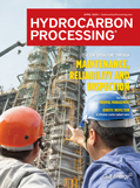Motors
Engineering Case Histories: Case 115: A method for analyzing catastrophic type failures
A portion of my consulting career involved investigating catastrophic type failures on machines, pressure vessels and structures in the industry.
History of the HPI-Up to the 1930s: Whales, lamps, automobiles, plastics and war
Over the next 10 mos, <i>Hydrocarbon Processing</i> will provide a detailed history of the origins and evolution of the hydrocarbon processing industry (HPI).
Safety and environmental benefits of reliability engineering
When you boil down the mission of reliability to its bare essence, the job is to deliver maximum operational availability for the least amount of money over the lifecycle of the asset.
Valves, Pumps and Turbomachinery: Use the correct lube oil grade to avoid equipment failures
Lubrication is imperative to the performance of rotating equipment.
Reliability: Viewing every maintenance intervention as an upgrade opportunity
When a long-time maintenance supervisor was promoted to the head of his refinery’s reliability department, he wanted to make “Precision Maintenance is Our Passion” his banner and headline.
How to support condition monitoring with wireless instrumentation networks
When <i>Wireless</i>HART first hit the market in 2008, most of the native devices using it were process measurement instruments.
Selecting the right rotary control valve
The primary function of a control valve is to regulate flow. Accurate, consistent and reliable performance of this task affects many important process unit or plant metrics,
Hydrocarbon Processing 2020 Awards WINNERS
<i>Hydrocarbon Processing</i>, the downstream processing sector’s leading technical publication, has announced the winners for its third annual awards.
Refining: Despite decline, Group 1 base stocks are here to stay
Given increasingly stringent automotive specifications and the advent of the International Maritime Organization’s 2020 sulfur regulations, the continued decrease in Group I base stocks demand should come as no surprise for anyone in the industry.
Variable capacity control technology facilitates efficient operation for reciprocating compressors
Reciprocating compressors are used extensively in refinery and petrochemical operations to keep feedstocks and products moving through miles of piping.

- Holland America starts pilot tests using renewable fuels on cruise liner 5/3
- U.S. admin sets path for ethanol aviation fuel subsidies 5/3
- Ryazan refinery (Russia) hit by drone strike 5/3
- Novatek's new Ust-Luga condensate unit set for June testing 5/3
- Thiozen pilot successfully produces zero-emission H2 from sour gas waste streams 5/3
- Mexico's Pemex exported 20,000 bpd of crude, fuel to Cuba in H2 2023 5/3




